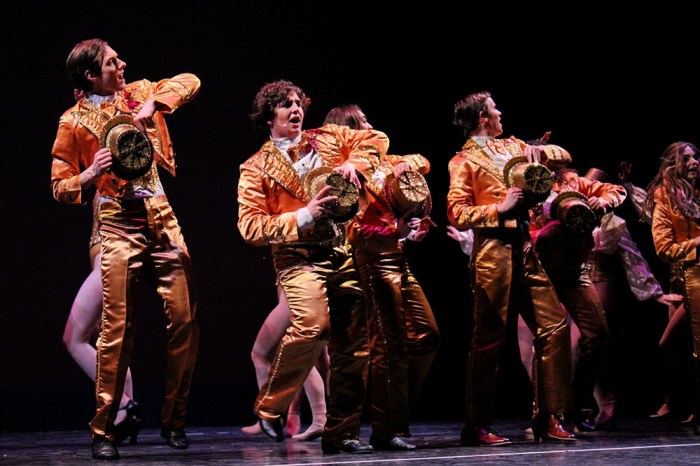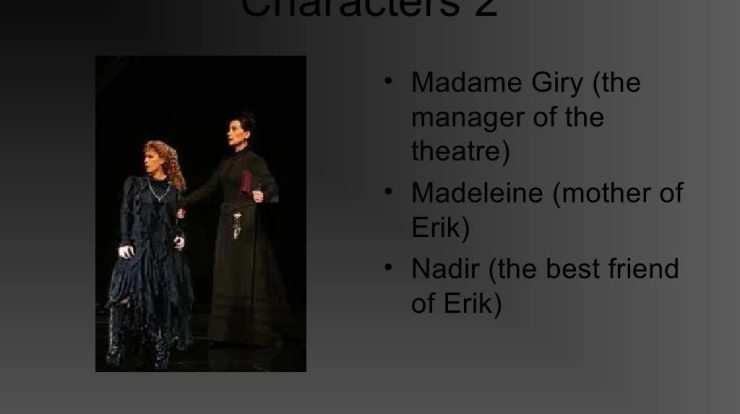Paul’s monologue from A Chorus Line stands as a seminal moment in musical theater history, captivating audiences with its raw emotion and exploration of identity and self-expression. This poignant speech, delivered with vulnerability and passion, offers a profound glimpse into the struggles and aspirations of an aspiring performer.
Paul’s monologue unveils the character’s complex motivations, desires, and relationships, while also delving into the broader themes of acceptance, authenticity, and the search for belonging.
Character Profile
Paul San Marco is a veteran dancer who has been with the chorus line for eight years. He is a talented and experienced performer, but he is also insecure and self-destructive.
Paul’s motivations and desires are complex. He wants to be a successful dancer, but he also wants to be loved and accepted. He is attracted to Cassie, but he is also afraid of getting hurt. He wants to be part of the group, but he also feels like an outsider.
Relationships with Other Characters
Paul’s relationships with other characters are often strained. He is jealous of Zach, the dance captain, and he resents Mike, the director. He is attracted to Cassie, but he is also afraid of her. He is close to Richie, another dancer, but even that relationship is not without its problems.
Paul is a complex and tragic character. He is a talented dancer with a lot of potential, but he is also self-destructive and insecure. His relationships with other characters are often strained, and he is often at odds with himself.
Monologue Analysis
Paul’s monologue in A Chorus Line is a powerful and moving expression of his dreams, fears, and insecurities. Through his raw and honest words, Paul reveals the complexities of his character and the challenges he faces as a dancer.
Central Themes and Ideas
Paul’s monologue explores several central themes and ideas, including:
- The pursuit of dreams:Paul’s monologue expresses his burning desire to succeed as a dancer, despite the obstacles he faces.
- The fear of failure:Paul also grapples with the fear of failure, which haunts him and threatens to derail his dreams.
- The importance of self-acceptance:Through his monologue, Paul learns to accept himself for who he is, flaws and all.
Language and Imagery, Paul’s monologue from a chorus line
Paul’s monologue is characterized by its vivid language and imagery. He uses strong verbs and sensory details to create a vivid picture of his inner world. For example, he describes his dancing as “a flame that burns inside me” and his fear of failure as a “monster that lurks in the shadows.”
Impact on the Audience
Paul’s monologue has a profound impact on the audience. It is a relatable and moving portrayal of the struggles and aspirations of an artist. Through his words, Paul connects with the audience on a deep level, inspiring them to pursue their own dreams and to embrace their true selves.
Contextual Background

The monologue from “A Chorus Line” holds significant historical and cultural relevance. It emerged amidst a transformative period in American society, marked by the rise of the LGBTQ+ rights movement and the growing visibility of queer experiences in popular culture.
The show “A Chorus Line” premiered on Broadway in 1975 and revolutionized musical theater. It broke away from traditional narratives, focusing instead on the lives and struggles of aspiring dancers auditioning for a Broadway show. The monologue in question, delivered by the character Paul, was groundbreaking in its raw and honest portrayal of a gay man’s experiences in the entertainment industry.
Significance for the LGBTQ+ Community
Paul’s monologue resonated deeply with the LGBTQ+ community. It provided a rare and poignant representation of a gay character on a mainstream stage, challenging prevailing stereotypes and giving voice to the experiences of a marginalized group.
The monologue’s impact extended beyond the theater. It became a touchstone for LGBTQ+ individuals, offering a sense of visibility and validation. It sparked important conversations about the challenges and triumphs faced by gay men and women in society, contributing to a broader understanding and acceptance of LGBTQ+ identities.
Critical Reception

Paul’s monologue in A Chorus Linehas garnered critical acclaim for its poignant exploration of identity, ambition, and the sacrifices one makes to pursue their dreams.
Interpretations
Critics have offered varying interpretations of the monologue’s meaning. Some view it as a commentary on the harsh realities of show business, while others see it as a universal exploration of the human condition.
Lasting Impact
Paul’s monologue has had a profound impact on theater and popular culture. It has been widely anthologized and studied in acting classes, and its themes continue to resonate with audiences today.
Cultural Impact: Paul’s Monologue From A Chorus Line
Paul’s monologue in A Chorus Linehas had a profound impact on the portrayal of LGBTQ+ characters in media, raising awareness, promoting acceptance, and shaping cultural conversations about identity and self-expression.
Influence on LGBTQ+ Representation
Prior to the monologue’s debut, LGBTQ+ characters were often marginalized or stereotyped in media. Paul’s monologue challenged these norms, presenting a complex and nuanced portrayal of a gay man. By humanizing Paul’s experiences and struggles, the monologue fostered empathy and understanding among audiences.
- Paul’s monologue shattered the myth that all gay men were promiscuous or flamboyant, presenting a character who was sensitive, introspective, and deeply affected by societal prejudice.
- It opened the door for more realistic and diverse LGBTQ+ characters in film, television, and theater, paving the way for greater visibility and representation.
Raising Awareness and Promoting Acceptance
Paul’s monologue played a crucial role in raising awareness about the challenges faced by LGBTQ+ individuals. By bringing their experiences to the forefront, the monologue helped to educate and inform audiences about issues such as discrimination, homophobia, and the importance of self-acceptance.
- The monologue sparked conversations about LGBTQ+ rights and equality, contributing to a growing movement for social change.
- It fostered a greater sense of understanding and empathy among non-LGBTQ+ individuals, promoting acceptance and inclusivity.
Shaping Cultural Conversations
Paul’s monologue has had a lasting impact on cultural conversations about identity and self-expression. By exploring the complexities of Paul’s journey, the monologue challenged societal norms and stereotypes surrounding gender, sexuality, and personal fulfillment.
- The monologue raised questions about the nature of masculinity and femininity, encouraging audiences to question traditional gender roles.
- It sparked discussions about the importance of self-acceptance and the right to live authentically, regardless of one’s sexual orientation or gender identity.
Clarifying Questions
What is the significance of Paul’s monologue in A Chorus Line?
Paul’s monologue is a pivotal moment in the musical, as it reveals his struggles with his sexuality and his desire for acceptance in the competitive world of dance.
How does Paul’s monologue explore themes of identity and self-expression?
Paul’s monologue delves into his journey of self-discovery and his struggle to reconcile his true self with the expectations of society.
What is the impact of Paul’s monologue on the audience?
Paul’s monologue resonates with audiences due to its raw emotion and its exploration of universal themes such as identity, acceptance, and the pursuit of dreams.
